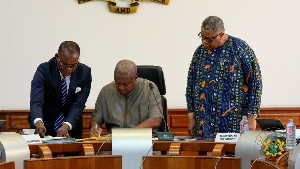The fact that John Mahama as president remitted the remainder of the four-month jail term imposed on the Montie 3 after consulting the Council of State at the time did not necessarily mean the council endorsed that decision, a former member of the council, David Kanga, has said.
The Montie 3: Godwin Ako Gunn, Alistair Taro Nelson and Salifu Maase (Mugabe) were granted the remission by Mr Mahama after having served a month of their four-month jail term pronounced on them by the Supreme Court for contempt.
They had made threatening comments against the Chief Justice and some members of the bench in connection with a ruling by the same court ordering the Electoral Commission to submit a list of voters who registered with NHIS cards.
A statement released by then-Communications Minister Dr Edward Omane Boama, said the remission was granted by the president in consultation with the Council of State.
But according to Mr Kanga, who spoke to Emefa Apawu on 505 on Class 91.3FM on Tuesday 28 February, “People were only guessing, they were only saying what they thought,” adding: “‘In consultation [with the Council of State]’ does not say the council approved, ‘in consultation’ does not mean that the council endorsed. If I say I’ve consulted you, it does not mean that you agreed with me.”
Asked what the advice of the council was to the president on that specific matter, Mr Kanga said: “I will not tell you because that will not be maturity, I’m not going to tell you that the council said this or that.”
Mr Kanga has also dismissed claims by President Nana Akufo-Addo that previous councils of state have been praise-singers who rubber-stamped the president’s every decision. “The council is very important,” he said, adding that it is not there to please the president.
The council, he said, gives the president a “reflective aspect” of his decisions. “I believe it is very useful”.
He refuted assertions that the council was a mere rubber stamp, explaining: “That’s not true. I can assure you while I was on that council there were requests from the president which we did not approve, we did not endorse them and we did not have to come out drumming” it in the public.
“There have been instances where the council has not just endorsed proposals from the president but I’m not going to go and say it was this one or that one.The council did a good job.”
General News of Wednesday, 1 March 2017
Source: classfmonline.com













